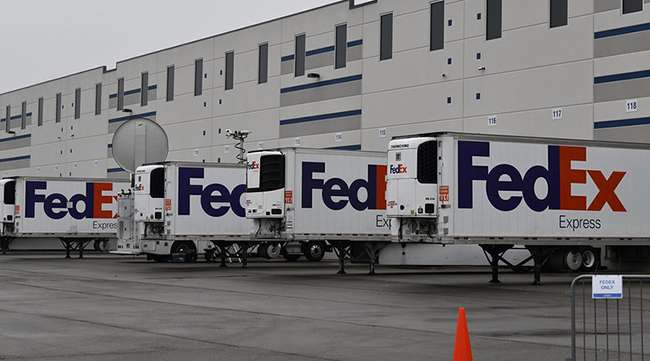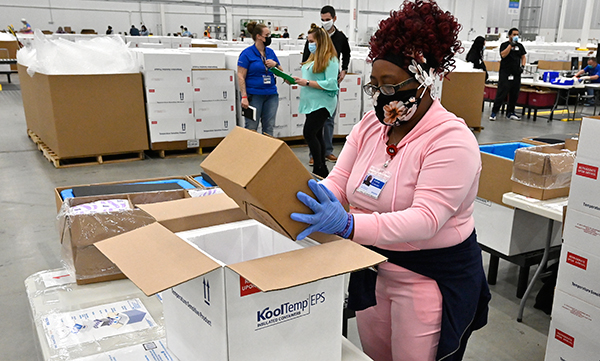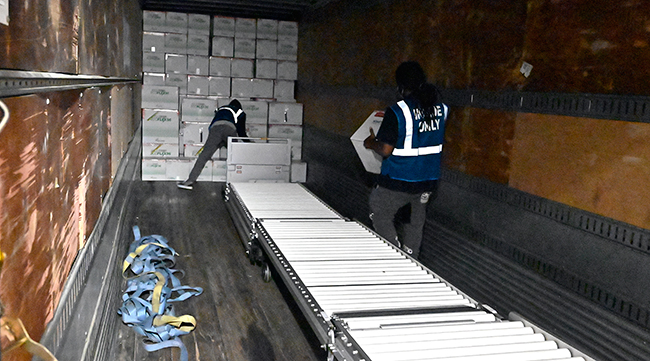Shipping Begins for Third Vaccine; J&J Looks for Partners

[Ensure you have all the info you need in these unprecedented times. Subscribe now.]
Johnson & Johnson is looking for manufacturing partnerships to increase supply of its COVID-19 vaccine that was cleared Feb. 27 by U.S. regulators, Chief Executive Officer Alex Gorsky said.
J&J will deliver 3.9 million doses of its one-shot vaccine within the next 24 to 48 hours, Gorsky said March 1 in a telephone interview. The company wants to speed up its timeline of supplying enough vaccines to immunize 20 million Americans by the end of the month and a total of 100 million by the end of June, he said.
“We are doing everything we can partnering with the U.S. government and other external manufacturers to see what we can do to accelerate and increase that number as well,” Gorsky said.

A McKesson employee packs a box of the Johnson & Johnson COVID-19 vaccine for shipping from their facility in Shepherdsville, Ky. (Timothy D. Easley, Pool/Associated Press)
“J&J distribution and delivery will be uneven across these early weeks in March,” said Jeff Zients, the Biden administration’s COVID-19 response coordinator, at a White House briefing on March 1. “The company expects the delivery to be predominantly in the back half of the month.”
J&J’s manufacturing footprint for its COVID-19 vaccine spans the U.S., Europe, Asia and Africa, and the company aims to have eight facilities operating by midyear. Production, including quality testing and release, takes roughly three months, during which the vaccine often crosses multiple borders for various steps.
Gorsky acknowledged that the company had hit supply snags in its efforts to boost production in the U.S. In its initial contract with the Trump administration, J&J agreed to supply 12 million doses by the end of February, including two million it planned to deliver in January.
“In my more than 30 years in the industry, what I can tell you is this kind of a ramp-up is never — or rarely — what I would call a linear shot,” Gorsky said. “There are almost always going to be unanticipated challenges along the way.”
In the U.S., J&J has contracted Emergent BioSolutions Inc. to manufacture its drug substance, and Catalent Inc. and Grand River Aseptic Manufacturing Inc. in Grand Rapids, Mich., to fill its vials with the substance. FedEx Express announced it has begun shipping the newly approved COVID-19 vaccine on behalf of McKesson Corp. to dosing centers throughout the United States.
The Financial Times reported Feb. 27 that Catalent had to perform manual inspections after suffering a setback that could have affected U.S. delivery targets.
Still, Gorsky is confident J&J will deliver on its future goals. “One of our facilities was literally a parking lot 12 months ago,” Gorsky said. “Today it’s one of the most advanced bio-pharmaceutical vaccine manufacturing facilities in the world. We’re learning along the way.”
The company is focusing on two parts of its production process to speed supply. One is its capacity for making a live cold virus, called an adenovirus, that’s used in the shot to trigger an immune response that fights off infection.
Gorksy also wants to augment the company’s fill-finish facilities, that final step where the vaccine is placed in vials. Fill-finish capacity is limited, he said, and as result, the company is looking to increase it in the future.

The first boxes of the Johnson & Johnson COVID-19 vaccine are loaded into a truck at the McKesson facility in Shepherdsville, Ky. (Timothy D. Easley, Pool/Associated Press)
“We’re leaving no stone unturned in terms of partnerships,” he said. “One of the most important lessons of the pandemic is the power of collaboration.”
J&J remains in active discussions with the U.S. government about exercising options for additional doses, Gorsky said. Globally, he sees it serving an important role, too.
BREAKING: The first @UPS truck carrying the Johnson & Johnson vaccine just arrived at the Worldport hub in Louisville. More trucks carrying the vaccine will arrive throughout the day. Deliveries start TOMORROW. pic.twitter.com/Aud092wQ24 — Pete Muntean (@petemuntean) March 1, 2021
The company will be offering the shot on a not-for-profit basis amid the pandemic, at a price that will not exceed $10. In comparison, the Pfizer Inc.-BioNTech SE vaccine costs the U.S. $39 for the full regimen, while Moderna Inc.’s goes for $33 for both doses. The price difference will be critical abroad, Gorsky said.
Want more news? Listen to today's daily briefing below or go here for more info:




